new posts in all blogs
Viewing: Blog Posts Tagged with: credit industry, Most Recent at Top [Help]
Results 26 - 38 of 38
How to use this Page
You are viewing the most recent posts tagged with the words: credit industry in the JacketFlap blog reader. What is a tag? Think of a tag as a keyword or category label. Tags can both help you find posts on JacketFlap.com as well as provide an easy way for you to "remember" and classify posts for later recall. Try adding a tag yourself by clicking "Add a tag" below a post's header. Scroll down through the list of Recent Posts in the left column and click on a post title that sounds interesting. You can view all posts from a specific blog by clicking the Blog name in the right column, or you can click a 'More Posts from this Blog' link in any individual post.

By:
admin,
on 10/30/2011
Blog:
Litland.com Reviews!
(
Login to Add to MyJacketFlap)
JacketFlap tags:
primary,
Christian,
parrot,
young children,
justice,
parent,
morals,
reader,
special education,
teach,
virtue,
advanced reader interest,
Summer/vacation reading,
children's books,
book reviews,
books,
cricket,
family,
courage,
bullying,
book,
fiction,
ethics,
book review,
children's,
character,
homeschooling,
disabled,
classroom,
review,
reading,
Uncategorized,
kids,
generosity,
friendship,
teaching,
woods,
juvenile,
homeschool,
children's lit,
character education,
book club,
young readers,
generations,
differences,
ethics/morality,
teachers/librarians,
character formation,
Add a tag

Brown, Bea (2011) Wally the Cockeyed Cricket. Mustang, OK: Tate Publishing. ISBN 978-1-61777-106-4. Recommended age 8 and under.
Publisher’s description: When Wally the Cockeyed Cricket finds himself trapped in Mrs. Grumpydee’s kitchen, he sings a sad song and Mrs. Grumpydee’s locks Wally in a jar. When the jar is knocked over and shatters, Wally the Cockeyed Cricket sings a different tune.
Our thoughts:
Read it—see it—listen to it! The great thing about books from Tate Publishing is that you do not need to choose between print and audio formats because books have a code that permits you to download the audio version on MP3 too! The print version has beautifully captivating illustrations. Yet the young man (ok, he sounds young to this old reviewer!) reading the audio does an excellent job at it. A great enhancement to teach reading to little ones :>)
Of course, the most important reason to consider adding this book to your child’s bookshelf is because they will enjoy the story! As evidenced by its title, Wally looks a little different than most crickets. He doesn’t think anything of this difference and is happy as can be. Until, that is, he unfortunately wanders into Mrs. Grumpydee’s kitchen! Captured, bullied and made a public spectacle, Wally never loses courage or confidence. Helped with the aid of a complete stranger, he is rescued and makes a new friend. Virtues exhibited are courage, justice and friendship. A feel-good story where the good guys win! Great parent-child sharing, Pre-3rd grade class or homeschool, bedtime reading, gift giving, therapy use, and family book club! Grab your copy at the Litland.com Bookstore.

By:
admin,
on 10/30/2011
Blog:
Litland.com Reviews!
(
Login to Add to MyJacketFlap)
JacketFlap tags:
Christian,
book club,
Catholic,
Summer/vacation reading,
ethics/morality,
children's,
character,
homeschooling,
homeschool,
classroom,
homeless,
children's lit,
character education,
young readers,
generations,
differences,
indigent,
teachers/librarians,
character formation,
review,
reading,
kids,
children's books,
books,
winter,
teaching,
family,
courage,
generosity,
friendship,
childrens book,
book,
fiction,
ethics,
book review,
juvenile,
primary,
Uncategorized,
young children,
justice,
nurse,
young reader,
poverty,
poor,
parent,
morals,
reader,
special education,
teach,
virtue,
single parent,
marginalized,
Add a tag
Warren, Jill. (2011) Abe’s Lucky Day. Outskirts Press Inc. ISBN 978-1-4327-7305-2. Age 8 and under.
Publisher’s description: Any day can be a lucky day. Abe is a homeless man who lives in the alley behind a bakery and winter is coming. What will happen on his lucky day that will change his life?
Our thoughts:
Introducing us to the varied faces of distress and homelessness, Abe’s Lucky Day reminds us that , while food, warm clothes and dry beds feel great, helping others feels even better. Illustrations permit the child to imagine themselves in the story, and so can feel the heartwarming rewards of selflessness…definitely good for your Litland.com family book club or a preschool classroom. Part luck and lots of kindness, Abe’s Lucky Day infuses a desire for kindness and generosity into its reader’s mind and heart, and is sure to strengthen bonds within the family reading it as well :>) Great for gift-giving, pick up your copy in our Litland.com Bookstore!

By: Kirsty,
on 8/25/2011
Blog:
OUPblog
(
Login to Add to MyJacketFlap)
JacketFlap tags:
Current Affairs,
prison,
offences,
justice,
punishment,
riots,
sentencing,
*Featured,
Law & Politics,
offenders,
looting,
criminal justice,
england riots,
susan easton,
Add a tag
By Susan Easton
In the wake of the recent riots, much attention has been given to the causes of the riots but an issue now at the forefront of press and public concern is the level of punishment being meted out to those convicted of riot-related offences. Reports of first offenders being convicted and imprisoned for thefts of items of small value have raised questions about the purposes of sentencing, the problems of giving exemplary sentences and of inconsistency, as well as the issue of political pressure on sentencers.

 "CONCLUSION [OF THE MARYLAND STATE BOARD OF EDUCATION]:
"CONCLUSION [OF THE MARYLAND STATE BOARD OF EDUCATION]:
...because we find that the local board has failed to provide any rationale for its decision, we reverse and remand [the appeal case of
Global Garden Public Charter School ] so that the local board may reconsider its decision in light of the rulings we have made in this case. We expect that such reconsideration shall occur within 90 days of the date of this decision."

By: Lauren,
on 11/30/2010
Blog:
OUPblog
(
Login to Add to MyJacketFlap)
JacketFlap tags:
racial,
democracy,
US,
Sociology,
videos,
Education,
Politics,
Racism,
youtube,
Harvard,
activism,
justice,
warren,
education reform,
embrace,
*Featured,
mark warren,
fire in the heart,
0vpz05pscki,
fz3ymlmng2c,
uhucmema,
Add a tag
Mark R. Warren is Associate Professor of Education at Harvard University. He is a sociologist and has published widely on community organizing and on efforts to build alliances across race and class to revitalize urban communities, reform public education and expand democracy. Warren is the author of Fire in the Heart: How White Activists Embrace Racial Justice and you can read his previous OUPblog post on racism here.
In the videos below, he discusses his book, race relations in schools, and activism.
Click here to view the embedded video.
Click here to view the embedded video.
Click here to view the embedded video.
Want to see more videos? Visit OUPblog on YouTube.

By:
kidswhoread,
on 10/30/2010
Blog:
Kids Who Read
(
Login to Add to MyJacketFlap)
JacketFlap tags:
justice,
strong girl character,
9-12 Grade,
Mystery & Suspense,
Enjoyable for parents,
Fantasy & Other Worlds,
suspenseful,
magic,
courage,
friendship,
Fantasy,
girls,
series,
Series Books,
girl power,
high school,
power,
Add a tag
Star Crossed by Elizabeth C. Bunce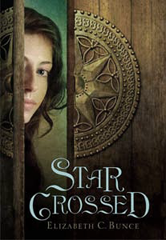
This is Elizabeth Bunce’s second novel and the first in a new series. I loved her first book, A Curse Dark As Gold, an intriguing interpretation of the Rumplestiltskin folktale, and I eagerly looked forward to her next book. A genre, fantasy series, usually less favored by me, Star Crossed nevertheless delivers on many of the same levels: a strong, resourceful, true-hearted heroine; a diverse cast of interesting characters; vivid description; and the entertainment of life’s deeper questions.
Set in a fantasy world that atmospherically parallels eastern Europe in the late middle ages, this tale is narrated by a girl who has had to make her way into a hostile world at a very young age. She is on a singular mission—to stay alive. She becomes a very good thief, forger, and spy. But a near brush with death from a failed caper at the beginning of the story propels her into a mountain castle. Here she will sit out a snowbound winter with a cast of characters at the center of a budding rebellion.
Celyn, as she calls herself, is afraid of nothing. She uses her talents to find out everything there is to know about the castle and its inhabitants, slowly flushing all mysteries into the light. The reader comes along on her journey, flinching at her every daring move, as each of the characters slowly but inevitably reveals the clarity of their position in the central conflict.
Celyn is tough, resilient, and clever; she knows and protects good whenever she sees it. Readers of all ages who have enjoyed the Bloody Jack books will also like this book. The plot is tightly wovern and requires the reader to pay attention and work things out, but there is nothing inappropriate for the youngest of accomplished readers.
Gaby Chapman








By:
kidswhoread,
on 12/13/2009
Blog:
Kids Who Read
(
Login to Add to MyJacketFlap)
JacketFlap tags:
6-8 Grade,
Enjoyable for parents,
3-5 Advanced Read,
Uncategorized,
friendship,
Historical Fiction,
coming-of-age,
justice,
tragedy,
Add a tag
Lizzie Bright and the Buckminster Boy by Gary D. Schmidt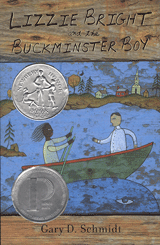
Fiction tends to follows certain rules, particularly fiction for kids. The reader is satisfied when the bad guys get their due, and when true friendship endures. But fiction based on a real event cannot necessarily follow those rules, because in real life, often good guys lose really badly and friendships get lost forever. In 1911, the lives and homes of the people of Malaga Island off the coast of Maine did get destroyed by some greedy, powerful men from the neighboring mainland. Nothing good came of it; the powerful men never got the tourist attraction they wanted and the people who lived there never came back.
Author Gary D. Schmidt populates this story with the new minister’s son who lives on the mainland and an orphaned girl, the youngest of several generations of African-Americans to call Malaga home. Turner finds his starched white shirts and the scrutiny due to the new minister’s son suffocating. He meets Lizzie, who rows over from her island to dig for clams on the mainland beach. Their instant liking for each other deepens into a solid friendship. He believes he can save her. She tells him he isn’t thinking straight. She is the wiser of the two.
This is a tale of the war between two human instincts: the desire to be generous and kind to others and the coexisting capacity to treat fellow humans cruelly and without conscience. It is told with a cast of colorful characters on a backdrop of natural beauty by a sensitive and lyrical writer. Written for middle school and older elementary school kids, it is also a joy to read for an adult.
Gaby







By: SarahN,
on 11/17/2009
Blog:
OUPblog
(
Login to Add to MyJacketFlap)
JacketFlap tags:
Politics,
new york,
Current Events,
American History,
John,
York,
Eric,
A-Featured,
Media,
New,
terrorism,
justice,
Michael,
Elvin,
Lim,
Eric Holder,
Holder,
vengeance,
Elvin Lim,
John Yoo,
Khalid Sheikh Mohammed,
Michael Goodwin,
Yoo,
Khalid,
Sheikh,
Mohammed,
Goodwin,
Add a tag
Elvin Lim is Assistant Professor of Government at Wesleyan University and author of The Anti-intellectual Presidency, which draws on interviews with more than 40 presidential speechwriters to investigate this relentless qualitative decline, over the course of 200 years, in our presidents’ ability to communicate with the public. He also blogs at www.elvinlim.com. In the article below, he examines our nation’s concepts of vengeance and justice in light of alleged 9/11 mastermind Khalid Sheikh Mohammed’s forthcoming trial in New York City. See Lim’s previous OUPblogs here.
There are four reasons which have been supplied to suggest that Khalid Sheikh Mohammed (KSM) does not deserve a civilian trial in New York:
1. This is what KSM wants – a show trial, and he should not get what he desires.
2. The trial will increase the risks of a terrorist attack in New York.
3. Classified information will be released in a civilian court trial, to the benefit of potential future terrorists.
4. The injury KSM has inflicted is a war crime, and not a domestic criminal matter.
1-3 are unverifiable predictions, sub-points to the main point, 4, which is the motive force behind the considerable agitation behind Attorney General, Eric Holder’s decision. Those who oppose a civilian trial for KSM want vengeance more than they want justice. This is exactly what Michael Goodwin has argued:
“Either try the detainees in military courts on secure bases or, best of all, give them death now. Mohammed and some others already acknowledged guilt and said they were ready to die.
I say we take yes for an answer.”
Well, there we have it. Goodwin wants vengeance primarily, and justice only incidentally. Now, vengeance and justice are not unrelated. Vengeance presumes the existence of guilt, so the pursuit of vengeance can lead to justice. Indeed, in an anarchic, godless world of all against all, vengeance is the closest thing there is to justice. To speak of justice would be a categorical mistake because without the apparatus of sovereignty and law, it is a standard that stands on stilts. We say “Justice under the Law” because without law, justice is a meaningless concept.
Goodwin and others like Mayor Rudy Giuliani who want to deny KSM a civilian trial believe, though they have not fully articulated their reasons, that the international milieu exists as a state of nature in which there is no universal law and no universally accepted sovereign law-giver, and therefore, the pursuit of justice is folly and the pursuit of vengeance necessary. If there is neither legality nor illegality, then there is only strength and weakness. Vengeance will have to do. This is why Rudy Giuliani insists on the frame that we are a nation at war, that we are dealing with terrorists or “enemy combatants” and not what John Yoo called “garden-variety criminals.”
To be sure, in a government of laws such as in a liberal democracy, justice takes on higher attributes that vengeance does not (and cannot). While justice is about law; vengeance is about necessity because it privileges immediate judgment over the process that would deliver such a judgment. While vengeance gives specific solace to those who were injured, justice assures all citizens that the system in which they conduct themselves works, – i.e., while vengeance is pointed, justice is blind, and while vengeance is preponderant, justice is proportionate.
Well and good. But as we consider whether or not KSM should have been granted a civilian trial, we need to determine the context in which we make this judgment: is terrorism a domestic criminal matter or an act of war? If the context is the former, then the Constitution takes precedence and it makes sense to speak of justice and that is what KSM deserves. If it is the latter, then because there is neither universal law nor a sovereign law-giver in the international milieu, KSM will have to suffer our vengeance because justice is not an alternative.
We have not settled on an answer to this question of whether or not terrorism is a criminal or a war crime because our historical definition of war has not caught up with its modern incarnation in which deterritorialized non-state actors perpetrate acts of violence. Our discussion over what KSM deserves is a footnote to this larger debate.

By:
kidswhoread,
on 10/28/2009
Blog:
Kids Who Read
(
Login to Add to MyJacketFlap)
JacketFlap tags:
girls,
Series Books,
survival,
power,
ships,
justice,
Reluctant Reader,
strong girl character,
6-8 Grade,
9-12 Grade,
Enjoyable for parents,
3-5 Advanced Read,
pirate book,
friendship,
Adventure,
Add a tag
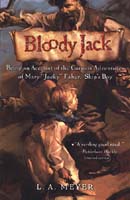 Bloody Jack by L.A. Meyer
Bloody Jack by L.A. Meyer
It is 1797 in London and a young girl has just been put out on the street. All of her family has died of the pestilence and she has nothing but the clothes on her back. Oh, wait! Soon she is robbed of even those by a gang of orphans in need of new clothes. The girl who has her new clothes looks back at her and says, “Well, come on then. And quit your sniveling.” The girl, who narrates this story, writes, “I snuffles and gets up.”
She weeps, she fears, she loses, but she keeps getting up throughout this highly entertaining story of a girl who disguises herself as a boy so she can become a ship’s boy, avoid being hung for thievery, and get enough to eat. I usually demand more than pure entertainment from the books I read–I want to be able to see the world in a new way or learn something thrilling–and I usually don’t like series books, but I finished this book with a single thought: I wanted the next book in the series.
The character of Mary who becomes Jacky leaps from the pages. The endless series of riotous adventurous never seem contrived. All resolutions feel perfectly apt. Danger never disappears, but evil always gets its satisfyingly just desserts.
Bloody Jack will be enjoyed by kids who liked The Unfortunate Series of Events in their younger years, middle school and younger experienced readers who will not be confused by the occasional “guttersnipe” dialect of the narrator (“prolly” for probably; me mum and me dad, etc), high school readers who need a break from fantasy, teen-age angst, and vampire genres, and adults who just like to have fun reading. Attitudes towards the innate differences between the genders are of course amply explored and the romance is tender and true and not excessively graphic. I recommend not trying to find out if the author is male or female until you have read at least one book in the series.
Gaby Chapman








By: Rebecca,
on 9/1/2009
Blog:
OUPblog
(
Login to Add to MyJacketFlap)
JacketFlap tags:
Law,
Politics,
Current Events,
American History,
Eric,
A-Featured,
Barack Obama,
Obama,
Barack,
justice,
Dick,
Dick Cheney,
Cheney,
FBI,
September,
September 11,
CIA,
11,
Eric Holder,
Holder,
"chilling" effect,
Justice Department,
\ chilling\,
effect,
Department,
Add a tag
Elvin Lim is Assistant Professor of Government at Wesleyan University and  author of The Anti-intellectual Presidency, which draws on interviews with more than 40 presidential speechwriters to investigate this relentless qualitative decline, over the course of 200 years, in our presidents’ ability to communicate with the public. He also blogs at www.elvinlim.com. In the article below he looks at Holder’s decision to conduct investigations on the CIA. See his previous OUPblogs here.
author of The Anti-intellectual Presidency, which draws on interviews with more than 40 presidential speechwriters to investigate this relentless qualitative decline, over the course of 200 years, in our presidents’ ability to communicate with the public. He also blogs at www.elvinlim.com. In the article below he looks at Holder’s decision to conduct investigations on the CIA. See his previous OUPblogs here.
Attorney General Eric Holder’s decision to conduct investigations on the CIA presents a serious dilemma for the Obama White House, which was at pains to point out that Holder’s decision was independently made. I think the White House is being honest here, because these investigations will only be a distraction from health-care reform. The bigger problem thrown into sharp relief here, however, is that democracies’ commitments to justice and the politics necessary to deliver electoral and governing solutions do not always sit happily together.
The pursuit of justice (which is state-sanctioned retribution) is inherently a backward looking process. It most look to the past in order to establish that a wrong was committed. And to put things bluntly, even when properly meted out, justice often offers only cold comfort to whom injury was inflicted. Especially in politics, such returns are slow in the coming, if they come at all.
If the pursuit of justice pulls us back in time, the conduct of politics pulls us into the future. Power today is a derivative of the anticipated store of power tomorrow, which is itself a function of whether today’s promises are fulfilled tomorrow. Politicians (in active service) don’t have time for the past, for they must protect their future. President Obama is looking ahead to the health-care battles to come in the Fall, and he does not want (nor does he need) to be pulled back to rehash a contest with the last administration in which voters already declared him a winner in 2008. Justice and Politics do not go well in this moment, and Obama knows full well that he has more to lose than he has to gain in Holder’s investigation. To stay in office, he must offer a politics of solutions, and not the politics of redemption that his liberal base wants.
Strangely enough, Dick Cheney is on the side of liberal Democrats on this one, at least in the sense that he understands that democratic countries are bad war-makers. The difference of course, is that Cheney believes that democratic ends can be met with undemocratic means (while some liberals believe that war is sport of kings, not democracies). In Cheney’s own words on Meet the Press in 2001: “We have to work the dark side, if you will. Spend time in the shadows of the intelligence world.” Cheney’s thorough-going ends-justifies-means philosophy is revealed in his interview with Chris Wallace. “They looked at this question of whether or not somebody had an electric drill in an interrogation session — it was never used on the individual,” Cheney said of the inspector general’s report. “Or that they had brought in a weapon — never used on the individual.” This cavalier attitude towards undemocratic means stems largely from a very sharp line differentiating “us” and “them” in the neoconservative world-view, a line that takes off from a commitment to protecting the demos in a democracy and a characterization of all others as outsiders to our social contract. This line is imperceptible to the liberal eye fixated on universal justice, which presumes the basic humanity of even a terrorist suspect.
Democrats really want to go for Cheney, but they will have to settle for the CIA; Cheney wants to protect his legacy, but he will have to settle for a proxy war. The politicization of justice and the justiciation of politics are reifiying the turf battles between CIA and FBI, the very cause of the intelligence failures that led to September 11 in the first place. The mere fact that we are airing our dirty laundry in public is already having a “chilling” effect on CIA agents and both Cheney and Holder are complicit in this. Justice and Politics are friends to democracy individually, but we are better off without one of them in this case.

By:
kidswhoread,
on 8/18/2009
Blog:
Kids Who Read
(
Login to Add to MyJacketFlap)
JacketFlap tags:
friendship,
Adventure,
boys,
Animals,
immigration,
survival,
coming-of-age,
justice,
6-8 Grade,
9-12 Grade,
Real World Fiction,
recovery from trauma,
Add a tag
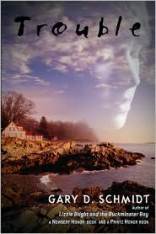 Trouble, by Gary D. Schmidt
Trouble, by Gary D. Schmidt
In Trouble, award-winning award author Gary D. Scmidt has given us a book that reminds us what a gift reading is. Not just beautifully written with exquisite imagery, a tightly woven plot, and myth-like symbolism, it is a story that nourishes the spirit. Enacted in the person of a fourteen-year-old boy, innate inhumanity and innate grace battle for hegemony.
Trouble brings sorrow. It strikes Henry’s family even though they may have every reason to believe they should have been able to avoid it. With his parents and sister engulfed in grief, Henry embarks on a quest with a good friend, a faithful dog, and a misunderstood enemy. Together, they overcome those who wish to do them harm, stumble upon one island of refuge, and battle their own demons.
This book is such a joy to read, I want to give absolutely nothing away. I would not recommend it for the reluctant reader, although experienced readers from middle school on up, both boys and girls, will most likely enjoy this book.Trouble is literature for kids at its finest.
Gaby Chapman







By: Rebecca,
on 7/14/2009
Blog:
OUPblog
(
Login to Add to MyJacketFlap)
JacketFlap tags:
Law,
Politics,
Current Events,
American History,
A-Featured,
Media,
Court,
justice,
conservatives,
democrat,
republican,
supreme court,
Supreme,
empathy,
liberals,
Sotomayor,
Sonia Sotomayor,
Sonia,
Add a tag
Elvin Lim is Assistant Professor of Government at Wesleyan University and author of The Anti-intellectual Presidency, which draws on interviews with more than 40 presidential speechwriters to investigate this relentless qualitative decline, over the course of 200 years, in our presidents’ ability to communicate with the public. He also blogs at www.elvinlim.com. In the article below he reflects on Sonia Sotomayer’s confirmation hearings. See his previous OUPblogs here.
than 40 presidential speechwriters to investigate this relentless qualitative decline, over the course of 200 years, in our presidents’ ability to communicate with the public. He also blogs at www.elvinlim.com. In the article below he reflects on Sonia Sotomayer’s confirmation hearings. See his previous OUPblogs here.
Judge Sonia Sotomayor’s nomination to the Supreme Court is probably going to be confirmed, but only after Republicans in the Senate put up a fight to appease the base that they tried to block the inevitable. There is value, though, in airing these differences, for they explain the irreconcilably liberal and conservative conceptions of justice that exist in America.
Conservatives have every right to disagree with Judge Sotomayor’s judicial judgments, as they are entitled to contest her understanding of the constitution. Most of their opposition will focus on the New Haven “reverse-discrimination” case (Ricci v Destafano) and this infelicitous remark: “I would hope that a wise Latina woman with the richness of her experiences would more often than not reach a better conclusion than a white male who hasn’t lived that life.” In short, the gist of the debate will be about the ambit of the Judge’s fellow-feeling. That is why Democrats and President Obama believe in the relevant virtue of “empathy” in a judge, whereas Republicans want a judge “for all of us” rather than “just for some of us.” Let us unpack this significant difference in perspective.
Democrats in general believe that justice is about helping the dispossessed, whereas Republicans in general believe that justice is about equality before the law. Democrats believe that justice is necessarily a distributional value. They believe that the world we are born into is structurally unfair and steeped in institutional biases, and it is the duty of the privileged and powerful to come to the aid of the dispossessed. That is why Democrats project their empathy to the particular few who they feel have been disadvantaged and not to all.
Republicans believe that the state of the world we are born into is morally neutral, and it is up to each individual to make the best of one’s talents in it. Because the ambit of Republican fellow-feeling extends to all, there is no extra virtue in empathy. Hence Democrats always presume an injustice to be righted (hence they are “progressive”), Republicans valorize and want to preserve the status quo (hence they are “conservative.”) These are irreconcilable positions because they are starting premises to much of the debate between liberals and conservatives. Logic can only be deployed to adjudicate the move from premise to conclusion, it can do nothing to discriminate between the choice of argumentative premises.
The pure liberal and pure conservative conceptions of justice are probably irreconcilable. But while the goalposts are not movable, we are. Ironically, empathy - the standard for Supreme Court justices that is under debate - is exactly what the two parties need to possess. If our starting premises are different and irreconciliable, the least (and probably the most) we can do is to try to understand why the other side thinks as it does. I think liberals can start by asking conservatives that if empathy is such a vice, would they teach their children to do onto others only what they would not want others to do unto themselves? And conservatives can return the favor by asking liberal parents this: if empathy is such a virtue, then shouldn’t every wrongdoing be at least partially exonerated?
Emotional and intellectual identification with alternative conceptions of justice is neither the only route to justice nor an insurmountable roadblock to it. Liberals are right in one sense - only empathy about the other party’s understanding of empathy will help resolve the partisan stand-off in Washington - but they should also practice what they preach.

Here's an interesting article from the Washington Post. "Maxxed-Out Man" Scurlock Right on the Money
It tells about the looming crisis in the credit industry, and for all Americans, and touts a movie that aired in March 2007 (now available on DVD) where Scurlock predicted problems that are now starting to be seen.
The last paragraph on page 3, though, is especially interesting to those of us in the CNMI. This movie mogul has a "next" project--on Larry Lee Hillblom, his death, and the paternity suit/probate fall-out. Now that's going to be an interesting movie!
(Thanks to Dan MacMeekin for the heads-up.)
And while we're on movies, here's a "movie" poster that's circulating. Found it at WryttenWyrd's blog. Provenance unknown. That would be cheap, tasteless humor.




 Abe’s Lucky Day
Abe’s Lucky Day



 Bloody Jack by L.A. Meyer
Bloody Jack by L.A. Meyer 

 Trouble, by Gary D. Schmidt
Trouble, by Gary D. Schmidt
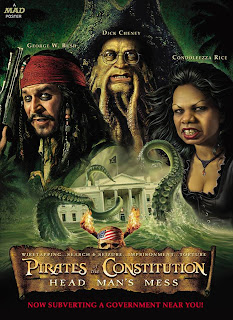
Congratulations!!
SOOOO happy! I'm glad that justice was served and I'm very glad that it seems your wonderful school will be able to put down roots!
Thanks, you two. Kerridwen, we're not quite there yet--the opinion only requires a reconsideration, but it does allow, we think, for a more open dialogue wherein we get a chance to convince everyone that our vision can withstand reality.